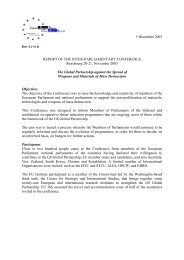The Obama Moment. European and American Perspectives
The Obama Moment. European and American Perspectives
The Obama Moment. European and American Perspectives
You also want an ePaper? Increase the reach of your titles
YUMPU automatically turns print PDFs into web optimized ePapers that Google loves.
20<br />
Introduction<br />
tools of aid, trade <strong>and</strong> diplomacy to stabilise troubled nations.’ 13 This is in line with<br />
<strong>European</strong> interests, <strong>and</strong> makes further sense due to the involvement of the EU in<br />
Afghanistan <strong>and</strong> the EU’s vested interest in meaningfully developing ongoing strategic<br />
partnerships with powers neighbouring Afghanistan, i.e. India, China <strong>and</strong> Russia.<br />
<strong>The</strong> same can be said of Iran, a country that is virtually a neighbour of the EU,<br />
bordering on Turkey, <strong>and</strong> another critical issue for the EU in spite of the different<br />
degrees of emphasis <strong>and</strong> focus between the EU <strong>and</strong> the US. In both cases, the change<br />
in US policy, now concentrating on diplomacy <strong>and</strong> finding political solutions as opposed<br />
to a former preference for a predominantly military option, greatly facilitates<br />
a <strong>European</strong> role supported by <strong>European</strong> public opinion, which is quite sceptical for<br />
the time being as to involvement in Afghanistan, largely seen as a Bush legacy. But it<br />
will be more difficult to achieve consensus on a substantial <strong>European</strong> involvement<br />
in stabilising Iraq, due to enormous public opposition to the Iraq venture. President<br />
<strong>Obama</strong>’s decision to withdraw all troops is an important step that will give more<br />
legitimacy to the Iraq government to find support among its neighbours <strong>and</strong> in the<br />
EU, as Glen Rangwala argues, 14 for what is going to be a very complicated <strong>and</strong> dem<strong>and</strong>ing<br />
period of reconstruction <strong>and</strong> peacebuilding. Here again the EU <strong>and</strong> the US<br />
will need to work closely with regional players like Iran <strong>and</strong> Turkey who will play a<br />
critical role in the future of Iraq.<br />
<strong>The</strong> disarmament agenda st<strong>and</strong>s in a category of its own. Throughout the Cold<br />
War <strong>and</strong> beyond, disarmament <strong>and</strong> non-proliferation remained extremely popular<br />
with <strong>European</strong> publics. In contrast, <strong>Obama</strong>’s audacious proposals (though backed<br />
by adherence to the CTBT, a long-st<strong>and</strong>ing <strong>European</strong> dem<strong>and</strong>) were received with a<br />
mixture of scepticism <strong>and</strong> hope among politicians. Former French foreign minister<br />
Hubert Védrine described <strong>Obama</strong>’s disarmament agenda as an ‘exercise in demagogy.’<br />
<strong>European</strong> leaders in both nuclear <strong>and</strong> non-nuclear states who were rightly<br />
critical of the Bush administration’s opposition to multilateral non-proliferation<br />
conventions have however re-stated their commitment to disarmament as part of a<br />
smart non-proliferation strategy based on a strong multilateral regime. <strong>The</strong> constellation<br />
of issues around disarmament particularly illustrates the cross-cutting question<br />
raised by Joshph Cirincione: ‘Now that the <strong>European</strong>s have what they seem to<br />
want in terms of US policy, what will they do with it?’ 15<br />
13. Daniel Hamilton <strong>and</strong> Nikolas Foster, chapter on ‘<strong>The</strong> <strong>Obama</strong> administration <strong>and</strong> Europe’ in this volume, pp. 37-<br />
55.<br />
14. Glen Rangwala, chapter on ‘From drawdown to partnership: Iraq after the <strong>American</strong> exit’ in this volume,<br />
pp. 125-135.<br />
15. See chapter by Joseph Cirincione <strong>and</strong> Alex<strong>and</strong>ra Bell on ‘Prague <strong>and</strong> the transformation of <strong>American</strong> policy’ in<br />
this volume, pp. 91-108.



